I'll reiterate what others have mentioned about grammar study in Anglophone countries being seriously lacking. Most of what I know about English grammar I learned from studying other languages and comparing their structures back to English. In school we never did much more than learning the parts of speech and some sentence diagramming (which was something different from drawing syntax trees). I doubt that most of my classmates graduated knowing the difference between a subject and an object. I was certainly never taught what verb tenses or conjugations were until I started taking Spanish in school.
While I was an exchange student in Croatia, though, I was forced to take English as a foreign language. I was surprised that I had trouble answering some of the questions, though to be fair that was partly due to the fact that they were studying outdated British usage (whereas I spoke American English). In particular, I recall that I
had never really distinguished the simple past from the pluperfect in English until I studied it formally in that class. I remember the teacher telling the other students not to listen to me because my English was "wrong". Although, I also told my classmates the same thing about her unnatural English.

I also remember being surprised that in their Croatian class they studied not only Croatian literature but also morphology, phonology, syntax, the historical development of the language, and so on.
